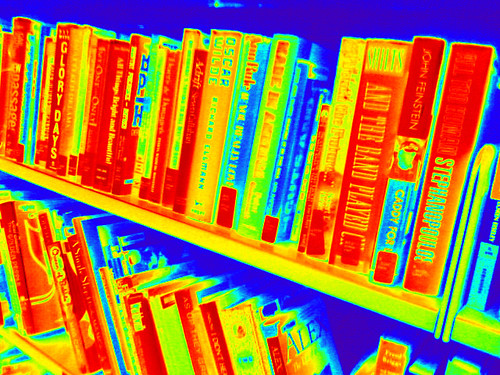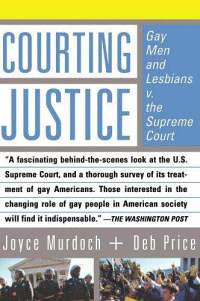
Chapter 7 opens:
Mike McConnell met Jack Baker on a blind date at a Halloween party in an Oklahoma barn in 1966 when they were 24-year-old graduate students. Distinctly unimpressed, McConnel scolded the matchmaker: "Don't ever fix me up again! I really don't like him." The matchmaker confidently responded, "You don't know what you're talking about. You two were destined for one another." McConnell admits, "He was right. It was true. I fell in love." On Baker's twenty-fifth birthday, the two young men became"betrothed," as they put it, in a private ceremony.
The book is Joyce Murdoch and Deb Price's 2001 Courting Justice: Gay Men and Lesbians v. the Supreme Court, a survey of the wins and, too often, losses in the struggle for equality. The book explores issues of marriage, issues of sex, issues of privacy, issues of community and service and so much more. It's the previously unwritten history of America.

For 530 pages, you hear about the issues that have mattered in the last century as well as this one, you learn about the people effected by judicial decisions (which includes a decision not to hear a case) and you learn about the Justices of the Supreme Court.
Such as Justice Lewis Powell who could have saved his reputation and his own self-image if he'd only a retired a year earlier. Retiring at the start of 1986 would have meant he never heard Bowers v. Hardwick and never took part in a homophobic argument that went against what Powell supposedly believed in when it came to privacy.
Michael Hardwick was arrested in his own residence for the 'crime' of having oral sex with another man. "Do you have the right to privacy in your home or not" should have been the issue but a campaign went on among Court Justices and their staff (such as clerk Michael Mosman) to draw a line between Americans, between hetero and homo sexual Americans. In a 5-4 decision (widely derided even in real time), the Court found that gay Americans had no rights to privacy (as the chapter on the decision is titled, "Branded Second-Class Citizens"). Powell could have (and some thought would) have sided with what became the minority. Instead, he decided to embrace hatred and stereotypes.
Powell's homophobia is on full display after he leaves the court and attempts to prepare for ways to defend it (while giving lectures to college students). His notes show frequent use of "AIDS" as a reason to attack same-sex practices. When he admitted in 1990 that his vote was "probably a mistake," he followed that by dismissing the case and the issue as "not a major case."
You'll learn about Justice Tom Clark whose son Ramsey Clark's agreed to review and critique Justice Clark's decisions for the book's authors. Tom Clark knew a man who engaged in same-sex coupling, Walter Jenkins, whom the LBJ White House kicked to the curb when he was entrapped by a police officer in a DC men's room. And his nephew Bobby Clark was gay. It didn't lead to empathy on the part of Justice Clark when deciding same-sex issues.
There's so much in this book and it hooks you very quickly.
McConnel's legal saga began in April 1970 when he accepted a $11,000 job as head of cataloging at a campus library at the University of Minnesota, where Baker was a first-year law student. Three weeks later, on May 18, the couple applied for a marriage license in Minneapolis. "PROSPECTIVE NEWLYWEDS REALLY IN A GAY MOOD," announced the St. Paul Pioneer Press. A Minneapolist Tribune photo showed two serious-looking young men in coats and ties. The university's student daily paper reported that the couple "caused only a minor stir" in the country licensing bureau, where "office workers stood in small clusters and tittered." Baker was quoted as saying, "If there's any legal hassle, we're prepared to take it all the way to the Supreme Court." He added, "This is not a gimmick. We really want to do it. A homosexual ought to have equal rights, privileges and responsibilities."
And they did try to take their case to the Supreme Court, however, the Court decided to turn the appeal away and dismiss it. Of course, dismiss is never that simple. For example, Barbara Underwood, a clerk for Justice Thurgood Marshall, advocated for Marshall to vote for refusing to hear the case and wrote that "it is probably reasonable, within the limits imposed by equal protection, for a state to limit the institution known as marriage to heterosexual couples" -- a position she would reverse years later as New York Solicitor General.
Courting Justice is our third pick ("Anthony's Iraq: The Logic Of Withdrawal" and "Tori's Piece by Piece" being the other two) in our series on important books of the last ten years that you should check your library for.
